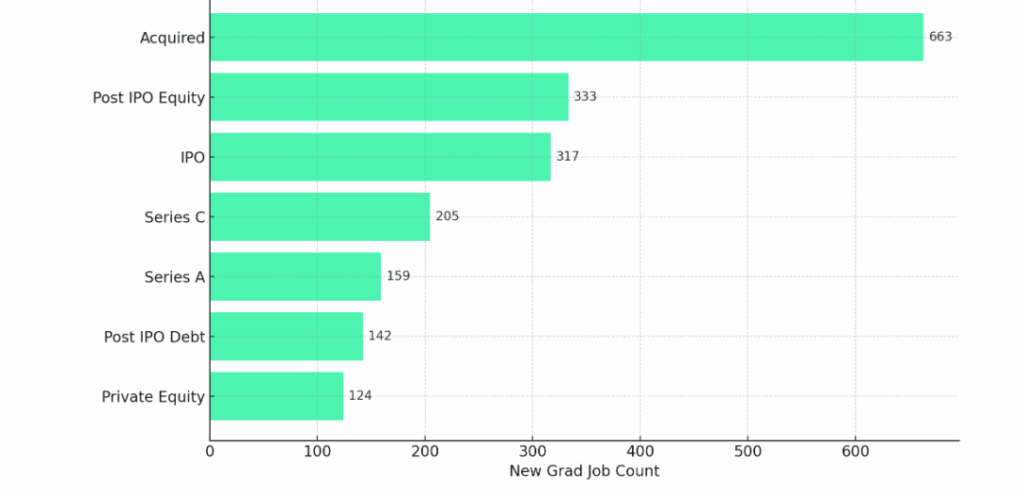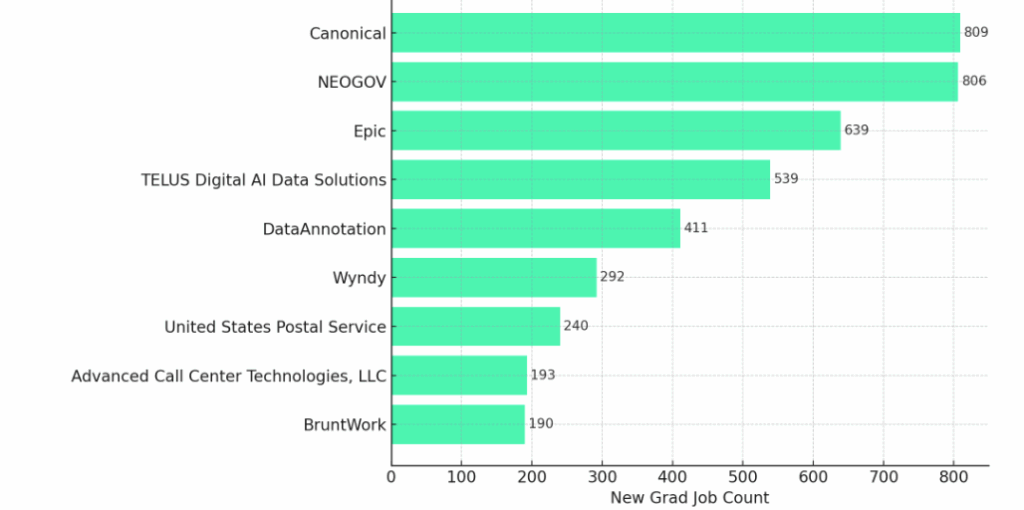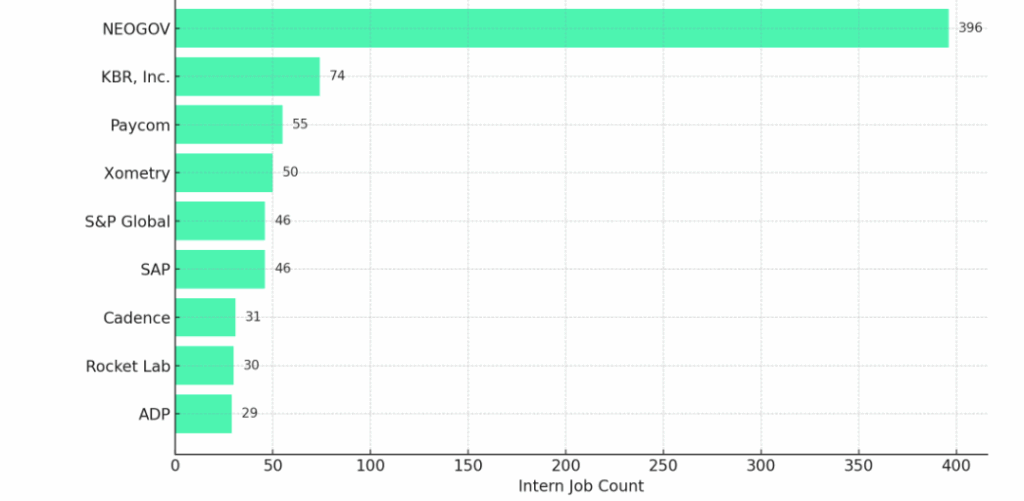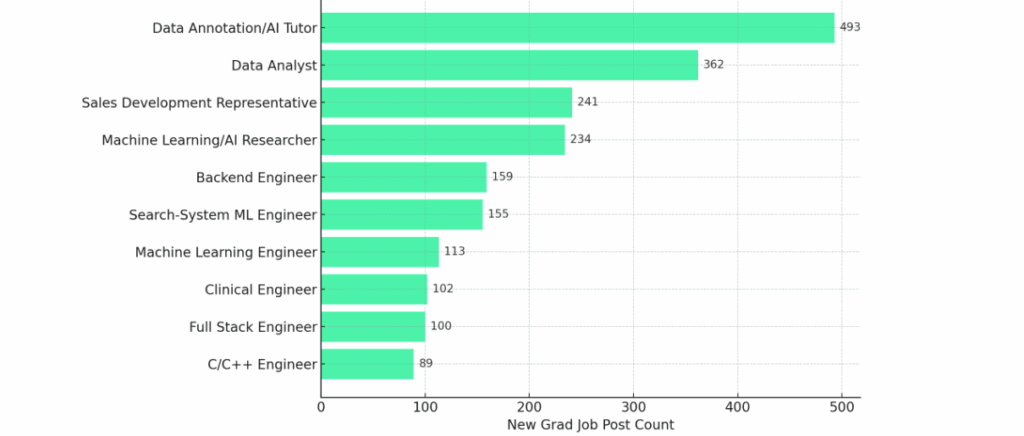The Intern & New Grad Job Market Unpacked: Data-Driven Insights for Job Seekers
Navigating the early career job market can feel overwhelming, but data can help cut through the noise. Whether you’re currently studying or looking to land that first full-time role, knowing which companies are hiring and what roles are in demand can give you the winning edge.
In this article, we will break down recent hiring trends based on company data to help you make smarter decisions. From startup funding stages to top employers and job categories, we’re going to cover everything you need to know. Let’s get to it!
From Series A to IPO: Who’s Hiring the Most

Not all companies hire new grads and interns equally—and their funding stage can reveal a lot about their hiring appetite. The above data table shows that companies further along in their growth journey tend to have more openings for new graduates.
Leading the pack are companies that have already been acquired, with 663 new grad roles. Post-IPO equity companies follow with 333 roles, and IPO-stage companies aren’t far behind with 317. Series C (205) and Series A (159) firms also make the list, but with fewer openings.
Interestingly, even companies in post-IPO debt and private equity stages are actively hiring, offering 142 and 124 roles respectively.
So what does this mean for job seekers?
Larger or more established companies—those that have gone public or been acquired—are typically expanding their teams and have the structure to onboard early-career talent at scale.
Startups at the Series A or C stage may still offer roles, but the volume is significantly lower, which means more competition and often less formal training.
Overall, the data suggest you should focus on companies that are post-IPO or acquired for more entry-level opportunities and structured programs.
Which Companies are Hiring New Grads and Interns in 2025?
Let’s look at which companies are hiring the most new grads and interns in 2025. With this info, you can keep an eye on companies hiring at scale. Keep in mind that agency companies were filtered out of this analysis, so these are direct hiring organizations, not third-party recruiters.
Top New‑Grad Employers

When it comes to offering entry-level roles for new grads, a few companies offer more opportunities than most. Canonical tops the list with a whopping 809 new grad job postings. NEOGOV is right behind with 806, followed by Epic with 639, TELUS Digital AI Data Solutions with 539, and DataAnnotation with 411.
What’s common among these companies? Many are tech-focused, and several—like Canonical and DataAnnotation—are involved in open-source software or data work.
These companies are clearly investing in junior talent, which could mean better training, mentorship, and opportunities to grow.
If you’re a recent grad looking for a stable first role with room to learn, these companies should definitely be on your radar.
Top Internship Employers

For students looking to get a foot in the door with an internship, certain companies are consistently giving that chance.
NEOGOV once again tops with 396 intern roles, showing a strong commitment to hiring early‑career talent. KBR comes in next with 74 internships, followed by Paycom with 55, and Xometry with 50. Rocket Lab, an aerospace manufacturer, has 30 internships.
Unlike with the new grads data, there isn’t much of a common theme here. These companies span a variety of industries, from defense and aerospace to HR software and manufacturing.
However, what they share is a steady investment in internship programs, which often serve as paths to full-time roles. For you as an intern, this means the potential for a long-term full-time opportunity if you perform well.
Top Jobs for Fresh Talent

We looked at the companies that are hiring the most new grads and interns, and now let’s look at which roles they’re hiring them for. Not all roles are equal in this aspect. There are some roles that are in especially high demand for early-career professionals, and the data makes that clear.
At the top of the list is Data Annotation/AI Tutor with 493 new grad job postings. This is followed by Data Analyst at 362, Sales Development Representative at 241, and Machine Learning/AI Researcher at 234 postings. So, what’s the trend that we see here?
All of these are in tech, yes, but more importantly, they all (apart from SDR, perhaps) have a large AI element to them. This reflects a larger industry trend: companies are investing heavily in AI and ML, and are always looking for entry-level talent to support these technologies.
Next Steps as a Job Seeker
So you’ve seen where the opportunities are, but now what? Here are some next steps you can take.
- Target companies based on hiring volume: Look into companies like NEOGOV that have a proven record of investing in early-career talent. They likely have good internship programs as well.
- Upskill or switch to high-demand roles: If there’s not much demand for your current role, take a look at the Top Jobs data table and consider switching to one of those roles.
- Use internships strategically: If you’re still in school or early in your job search, apply to internships at companies known for converting interns into full-timers. Even if an internship doesn’t lead to a job, it can still provide you valuable experience that can be helpful in the future.
Use these steps and insights to guide your job search strategy.
From Salary Floors to Search Fatigue: The Data Behind New Grads’ Job Outlook
We surveyed new grad job seekers on the Jobright platform to get a closer look at how this cohort is approaching today’s uncertain market. What we found paints a revealing, and at times sobering, picture of a generation facing one of the toughest job markets in recent years.
Job Searches Are Not Expected to Be Quick
50% of new grads expect their job search to take three to six months, while a third hope to land a role in under three. Just 17% think it could take up to a year. While most grads brace for a marathon rather than a sprint, their timelines may still be overly optimistic for today’s competitive landscape. According to research from The Wall Street Journal, the average time for people to find a job is now about six months
Salary Expectations Are Rising
75% of respondents wouldn’t accept less than $60,000 to start. The remaining 25% would consider $40,000 to $60,000, but zero respondents were open to unpaid opportunities. This unwavering salary floor creates a potential standoff between what grads demand and what employers are willing to pay.
They Still Believe in the ROI of a Degree
Despite mounting questions around the value of higher education, 83% of respondents said they believe their degree will pay off over time. Only 17% are unsure. This faith in their investment persists even as the job market continues to challenge traditional degree-to-career pathways.
Financial Independence Feels Uncertain
60% of grads expect to be financially independent before age 30. Around 25% expect to get there after 35, while the rest fall somewhere in between, or aren’t sure it will happen at all. The 15-year spread in expectations reveals just how unpredictable the path to financial stability has become.
Career Expectations Have Already Shifted
Almost 60% (58%) of graduates report that their career expectations have slightly lowered over the past year, while 25% see no change, and 17% have abandoned their original goals altogether. Market realities are forcing a recalibration before many careers have even begun — a sobering preview of the compromises ahead.
Growth Potential Tops the Priority List
When asked about top priorities, 50% of respondents chose “growth potential.” Others are focused on paying bills, gaining experience, or finding a dream role. The emphasis on future promise over immediate rewards suggests grads are willing to play the long game, if they can afford to.
Rejection Is Expected to Be Brutal
Over 65% expect 50+ rejections before landing a job, with most bracing for more than 100. The sheer volume of anticipated “nos” reveals a generation psychologically prepared for what amounts to a sustained campaign of professional rejection. Their expectations may actually align with reality: in 2024, job seekers needed to send 294 job applications to land a job, on average.
Money vs. Passion: Pragmatism Wins
When asked if they’d take a job they hate for good money, 50% say it depends on the salary, while 25% are split evenly between “yes” and “no” extremes. The death of “follow your passion” advice is evident — half are ready to negotiate their happiness based on the price tag.
Worry About Matching Parents’ Success Lingers
42% strongly disagree with worrying they’ll never achieve the life their parents had, while 25% agree or feel neutral, and 8% outright disagree. Even among the confident majority, the mere existence of this concern highlights the generational anxiety lurking beneath surface optimism.
College Regrets Are Common
All respondents said they would still go to college if they could go back in time, but an overwhelming 83% would choose a different major. The near-universal desire for a do-over suggests that hindsight has revealed significant misalignment between academic choices and career realities.
Conclusion
The early-career job market presents real challenges — from longer search timelines to higher rejection rates — but it’s not insurmountable. While the data reveals a tougher landscape than many new grads expect, it also shows where opportunities exist and how to find them.
The key is approaching your search with both ambition and realism. Know which companies are actively hiring, understand what roles are in demand, and prepare for a process that may take longer than you’d hoped. With the right strategy and persistence, you can navigate this market successfully.
Your career starts with that first role. Armed with better data and realistic expectations, you’re already ahead of the competition.
